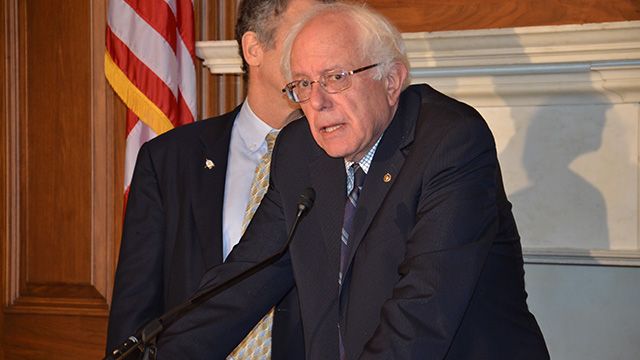
This post first appeared at The Nation.
The Senate will wrangle this week over whether to amend the Constitution to allow citizens and their representatives to organize elections where votes matter more than dollars.
The amendment that is being considered is a consequential, if relatively constrained, proposal, which focuses on core money in political concerns but which does not go as far as many Americans would like when it comes to establishing that money is not speech, corporations are not people and elections should not be up for sale to the highest bidder.
Yet it is difficult to underestimate the importance of the debate that will unfold this week. The debate signals that a grassroots movement has established the rational response to a political crisis created by US Supreme Court rulings (including, but certainly not exclusively, the Citizens United and McCutcheon decisions) that have opened the floodgates for domination of political debates by billionaire campaign donors and corporate cash.
Organizing and campaigning by citizens — working in conjunction with groups that have never been adequately funded, on a project that has never received a fair share of media attention — has gotten 16 states and more than 600 towns, villages, cities and counties to demand an amendment. And the Senate is taking that demand seriously enough to propose a fix, to organize a debate and to schedule votes that will provide a measure of the prospects for making a democracy amendment the 28th addition to the Constitution.
Senator Bernie Sanders, the Vermont independent who has proposed a more specific and aggressively worded amendment than the compromise measure that is expected to be considered this week, argues that this Senate debate on the issue of money in politics marks “a pivotal moment in American history.”
Though Sanders would go further than Democratic leaders in the Senate on a number of points, he has joined them in co-sponsoring the amendment by New Mexico Sen. Tom Udall that will be debated this week.
The Vermonter understands why this debate is so significant.
It is not because Senate consideration of the issue at this point will lead to the rapid amendment of the Constitution. In fact, no matter what Senate Democrats do, there will not be a sufficient majority in the chamber where a two-thirds vote is required to approve an amendment for consideration by the states. Nor is there any realistic chance that John Boehner will suddenly decide to lead the charge against the corporate campaign spending and billionaire manipulations that bought him the House speakership.
It is not because the amendment that is being advanced now is the amendment that will ultimately be added to the Constitution. Make no mistake, there will be a 28th Amendment; there must be if the American experiment is to survive as anything akin to a democratic republic. As with past amendments, however, this initial proposal for updating the Constitution will likely be altered — with language strengthened or weakened based on the ability of mass movements to place demands for more or less radical change.
So why exactly is this a pivotal moment?
Because when a movement becomes sufficiently dynamic to force a Senate debate — after just four years of organizing by groups like Move to Amend, Free Speech For People, Public Citizen, Common Cause, People for the American Way and allied groups at the local and state levels — that debate ought not be seen as beginning or the end of anything. It is a part of a process — an essential teaching moment, an essential organizing moment.
“It’s overwhelmingly clear what the citizenry wants: fed up with a system in which the super-rich and giant corporations are effectively able to buy politicians and policy, the American people are rising up and demanding a constitutional amendment to overturn Citizens United and restore our democracy,” explains Robert Weissman, the president of Public Citizen. “Whatever happens on the day (this week) is not long off when the 28th amendment becomes the law of the land.”
That’s what Sanders means when he speaks of a pivotal moment.
Millions of Americans are already engaged with the movement to amend the Constitution to get money out of politics — and with the broader movement to address the twin fallacies that money is speech and that corporations should have the same rights as human beings. Tens of millions more are supportive of the struggle. Indeed, polls show there is overwhelming support for the amendment among Americans — 73 percent in favor versus 24 percent opposed, according to a new Democracy Corps survey — and that this support crosses all lines of partisanship and ideology.
The Senate debate has the potential to get millions of additional Americans engaged with what Sanders refers to as “the major issue of our time — whether the United States of America retains its democratic foundation or whether we devolve into an oligarchic form of society where a handful of billionaires are able to control our political process by spending hundreds of millions of dollars to elect candidates who represent their interests.”
The fact that the issue is being treated seriously at the congressional level will merge a sense of urgency with a sense of possibility. This could have an impact on the 2014 Senate races; indeed, the Democracy Corps survey found “overwhelming cross-partisan support (73 percent) for a constitutional amendment to overturn Citizens United that can translate into added support for Democratic candidates who support the amendment and damage Republicans who oppose it.”
Significantly, the Senate debate has the potential to influence the outcome of election contests. The Democracy Corps polling memo concluded, “Democratic candidates can gain from supporting this amendment. A 48-11 percent plurality of voters say they are more likely to support the named Democratic candidate after hearing an argument for the proposal. This represents broad support, as the number actually increases among voters under 50 to a 41-point gap and among independents to 42 points.”
Those numbers may explain why Democratic senators who will never be confused with reformers have signed on as co-sponsors of the amendment proposal.
Ultimately, however, the amendment fight must be seen in a broader context than any Democratic political calculus. The movement must attract Republican support for an amendment. And this week’s debate will tell us about the prospects for bipartisanship. Will Republicans who face re-election this year in states where there is strong and well-organized support for an amendment — such as Maine’s Susan Collins, who faces amendment supporter Shenna Bellows — break with their party leadership and back this amendment? In open-seat races, will candidates such as South Dakota Democrat Rick Weiland, an outspoken amendment supporter, find their positions strengthened by an increased focus on the issue?
Constitutional amendments become viable when support for them grows so overwhelming that traditional partisan and ideological boundaries are broken. When this happens, the divide becomes less a matter of Republican versus Democrat or left versus right and more a matter of a broken present versus a functional future.
The corrupt political processes of the moment are not just anti-democratic, they are fundamentally unjust. What former Sen. Russ Feingold refers to as a system of “legalized bribery” allows billionaires and corporations to buy more than elections; they buy policies and crony capitalist arrangements that undermine the fairness, the capacity for improvement and the basic stability of America.
There is no question that the arc of human progress is long. But nor is there any question that it bends toward justice. This week’s Senate debate will not produce justice; but it will help to build the movements that are necessary to bend the arc.


